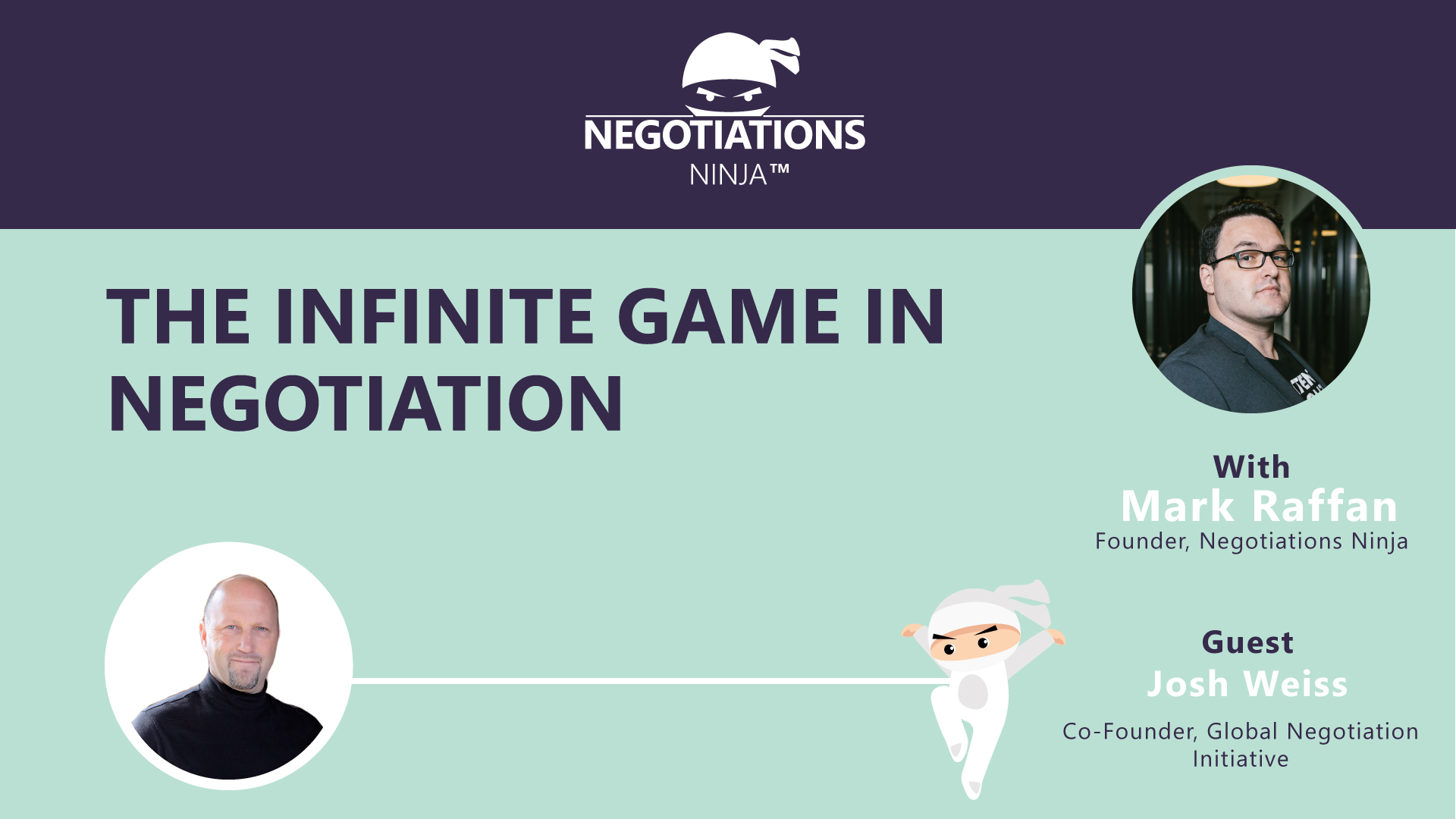When people think of negotiation—especially in Western cultures—they often think in finite terms. In a finite game, the rules are fixed until there’s a winner. In an infinite game, the rules change during play. It’s done so to bring as many people as possible into the play. The purpose of the infinite game is that things aren’t just about transactions or deals but revolve around a higher purpose.
How does this apply to negotiation? It’s about the relationship you develop with the people you’re negotiating with. The higher purpose isn’t a singular deal. Your next best customer is continuing to do business with the current one. When you’re thinking in infinite game terms, that’s the angle you take.
In this episode of Negotiations Ninja, Dr. Joshua Weiss shares more about how to embrace the infinite mindset in negotiation. Once you do, it changes the way you view everything. Listen to the episode to find out why!
Outline of This Episode
- [2:24] Learn more about Josh Weiss
- [4:09] What is the infinite mindset?
- [7:50] Is there room for both mindsets?
- [9:30] Is there resolution in an infinite game?
- [14:25] Improving your adaptability in a negotiation
- [17:50] Three ways to measure adaptability
- [29:27] Check out Josh’s children’s books
The businesses that survive embrace the infinite game
Josh became interested in this topic because of Simon Sinek’s book, “The Infinite Game.” He posits that people in business are jostling for dominance and survival. But the ones who survive do so because they understand business is an infinite game that’s constantly evolving and never-ending. It isn’t a finite game with a win/loss viewpoint.
He explores the differences between those but emphasizes the importance of thinking with an infinite mindset. People who are negotiating are constantly dealing with new information. Josh has moved away from developing plans toward the idea of contingency planning. Why?
Plans assume a constant landscape that is predictable. Negotiation never looks like that. Why not enter with the mindset that there could be multiple paths forward? You also recognize there are simply some things you don’t know yet. If you apply this, the finite game falls apart quickly.
What are the rules of negotiation? Are they clear? Do they apply across the board? The answer is that there are no “rules,” and therefore, a finite mindset cannot be applied. It moves people away from a transactional way of thinking toward building a never-ending relationship.
Is there room for both mindsets?
Does a finite mindset make sense in some circumstances? Josh notes that if you’re focusing on a positional negotiation, the relationship might not matter. But if the negotiation becomes interest-based, and you’re trying to build a long-term relationship, the model of the infinite game fits.
Level five leaders are playing an infinite game. They’re recognizing that the landscape is uncertain, but they have to think ahead to what’s next. Most interest-based negotiations also think that way. i.e., how do you take a good deal and make it better?
Is there resolution in an infinite game?
Finite games have rules and time constraints. There are players and observers in an established field of play. In an infinite game, there are known players, but there are also unknown players. In a negotiation, you know who the primary parties are, but numerous indirect parties impact things behind the scenes. The rules also change as things evolve. The objective is to perpetuate the game.
An infinite game doesn’t have to mean there isn’t an ending. You can view it as having a series of punctuated endings. That means you can reach agreements, but you aren’t done. You continue to work toward the next agreement and the next agreement, and so forth.
An infinite game doesn’t mean you won’t reach an agreement. Instead, it’s punctuated agreements that build on each other toward something much greater than a single deal or arrangement.
Resources & People Mentioned
- Dr. McFiddle’s Brilliant Book of Creative Conflict Potions and Other Magical Things
- Finite and Infinite Games by James Carse
- The Infinite Game by Simon Sinek
- The Art of Negotiation by Michael Wheeler
- Good to Great by Jim Collins
- 3 Ways to Measure Your Adaptability
Connect with Josh Weiss
- The Book of Real-World Negotiations: Successful Strategies From Business, Government, and Daily Life
- Connect on LinkedIn
Connect With Mark
- Follow Negotiations Ninja on Twitter: @NegotiationPod
- Connect with Mark on LinkedIn
- Follow Negotiations Ninja on LinkedIn
- Connect on Instagram: @NegotiationPod




